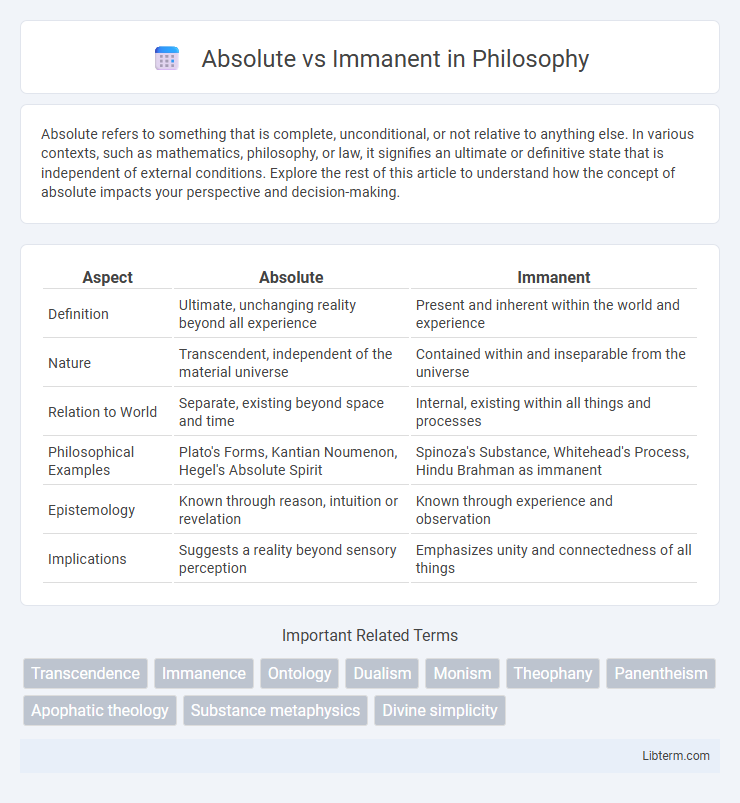Absolute refers to something that is complete, unconditional, or not relative to anything else. In various contexts, such as mathematics, philosophy, or law, it signifies an ultimate or definitive state that is independent of external conditions. Explore the rest of this article to understand how the concept of absolute impacts your perspective and decision-making.
Table of Comparison
| Aspect | Absolute | Immanent |
|---|---|---|
| Definition | Ultimate, unchanging reality beyond all experience | Present and inherent within the world and experience |
| Nature | Transcendent, independent of the material universe | Contained within and inseparable from the universe |
| Relation to World | Separate, existing beyond space and time | Internal, existing within all things and processes |
| Philosophical Examples | Plato's Forms, Kantian Noumenon, Hegel's Absolute Spirit | Spinoza's Substance, Whitehead's Process, Hindu Brahman as immanent |
| Epistemology | Known through reason, intuition or revelation | Known through experience and observation |
| Implications | Suggests a reality beyond sensory perception | Emphasizes unity and connectedness of all things |
Understanding the Concepts: Absolute vs Immanent
The concept of the Absolute refers to an ultimate, unchanging reality that exists independently of the physical world and human perception, often characterized by transcendence and universality. In contrast, the Immanent denotes a presence or force existing within and throughout the material world, emphasizing closeness, accessibility, and inherent existence within phenomena. Understanding the distinction between Absolute and Immanent is fundamental in philosophy and theology, as it shapes interpretations of divinity, reality, and the nature of existence.
Historical Perspectives on Absoluteness and Immanence
Historical perspectives on absoluteness emphasize the concept of an ultimate, unchanging reality often linked to divine or metaphysical principles, as seen in Platonic and Aristotelian philosophies. Immanence, rooted in Stoicism and Spinozism, highlights the presence of the divine or ultimate reality within the natural world and material existence. The evolution of these concepts influenced theological and philosophical debates on the nature of God, reality, and the universe throughout history.
Key Philosophical Definitions
Absolute refers to an unconditioned, independent reality that exists beyond all limitations and relations, often characterized as perfect, infinite, and eternal in key philosophical frameworks. Immanent describes the inherent presence and operation of a substance or principle within the realm of experience or the material world, emphasizing that divinity or ultimate reality pervades all phenomena without transcending them. These concepts contrast in metaphysics and theology, where Absolute denotes transcendence and immanence signifies an indwelling presence.
Major Thinkers on the Absolute
Major thinkers on the Absolute, such as G.W.F. Hegel and Baruch Spinoza, conceptualized the Absolute as an all-encompassing reality that transcends individual existence yet contains all within itself. Hegel's Absolute is understood as the unfolding of Spirit through history and dialectical development, while Spinoza identified the Absolute with God or Nature as a single, infinite substance. These perspectives emphasize the Absolute's role as the ultimate, unified foundation underlying diverse phenomena, contrasting with immanent philosophies that locate divinity or ultimate reality within the material world itself.
The Immanent in Modern Thought
The immanent in modern thought emphasizes the presence of divinity or ultimate reality within the natural world and human experience, rejecting the need for an external, transcendent source. Philosophers such as Spinoza and Hegel advanced the concept of immanence by arguing that God or the Absolute exists inherently within the universe's processes and structures. This perspective profoundly influences contemporary metaphysics, ethics, and spirituality by framing reality as self-contained and interconnected rather than dependent on an external Absolute.
Comparing Metaphysical Frameworks
Absolute refers to an unchanging, independent reality existing beyond human perception, often associated with transcendence and universality in metaphysical frameworks. Immanent denotes a reality inherent within the natural world or consciousness, emphasizing presence and interconnectedness in all things. Comparing these, Absolute metaphysics highlights a singular, ultimate source beyond phenomena, whereas immanent perspectives focus on divine or fundamental truths manifested within the material or experiential realm.
Implications for Theology
The distinction between Absolute and Immanent significantly influences theological interpretations of divine nature and presence. An Absolute view portrays God as transcendent, beyond all creation and human comprehension, emphasizing sovereignty and incomparability. In contrast, Immanent theology highlights God's presence within the universe and continuous interaction with creation, fostering concepts of relationality and accessibility in spiritual experience.
Absolute vs Immanent in Ethics
In ethics, the distinction between absolute and immanent principles defines whether moral values exist independently or are inherent within human experience. Absolute ethics posits universal, unchanging moral laws applicable across all cultures and situations, grounding morality in objective realities. Immanent ethics, conversely, views moral values as context-dependent and evolving within societal and individual frameworks, emphasizing adaptability and relational understanding.
Influence on Contemporary Worldviews
The concept of the Absolute shapes contemporary worldviews by emphasizing an ultimate, unchanging reality that transcends human experience, influencing metaphysical and philosophical frameworks. Immanence, highlighting the presence of divinity or ultimate reality within the material world, informs secular and spiritual perspectives that prioritize interconnectedness and immediacy. These contrasting ideas shape ethical systems, cultural narratives, and scientific approaches by framing existence either as grounded in an external absolute or within the evolving immanent reality.
Bridging the Divide: Toward a Synthesis
Bridging the divide between Absolute and Immanent reveals a synthesis where the transcendent nature of the Absolute coexists with the inherent presence of the Immanent in the material world. Philosophers like Hegel and Spinoza illustrate this integration by demonstrating how ultimate reality transcends yet pervades individual existence, uniting metaphysical absoluteness with experiential immanence. This synthesis promotes a holistic understanding of reality, dissolving dualistic separations and fostering a unified ontology that honors both the infinite and the finite.
Absolute Infographic

 libterm.com
libterm.com